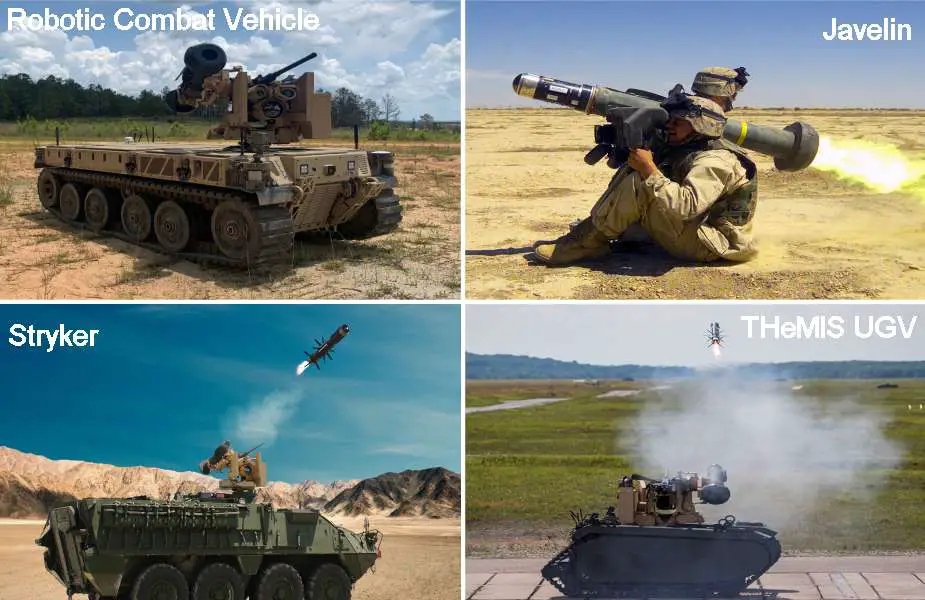On March 18, 2024, at the National Training Center (NTC) in Fort Irwin, California, a demonstration highlighted a significant advancement in the use of autonomous technologies in modern military strategy, with the successful launch of Javelin anti-tank missiles from two unmanned ground vehicles (UGVs) equipped with the Kongsberg-Javelin Common Remotely Operated Weapon Station (CROWS-J). This operation marked a first in terms of coordinating multiple UGVs for tactical deployment of the Javelin, showcasing the immense potential of autonomous technologies in conducting military operations.
Follow Army Recognition on Google News at this link

Javelin anti-tank missile on various combat ground platforms (Picture source: Lockheed Martin)
For reference, in May 2021, a multi-platform demonstration organized in collaboration with the U.S. Army and various defense contractors at the U.S. Army Redstone Test Center in Alabama showcased the versatility of the Javelin through the use of three different ground platforms: Oshkosh’s Joint Light Tactical Vehicle (JLTV), Qinetiq North America’s Robotic Combat Vehicle-Light (RCV-L), and Flyer Defense’s Ground Mobility Vehicle. Equipped with various configurations of the CROWS-J system and the Protector RS6 Heavy Remote Weapon Station, these vehicles launched Javelin missiles that successfully hit fixed tank hull targets at precise distances of 700 meters, 2,000 meters, and up to 3,250 meters. This ability to successfully engage targets at such ranges highlights the extended range and tactical flexibility of the Javelin in a multitude of combat scenarios.
These real-life tests underscored the Javelin's capability to be deployed from mounted vehicles, achieving successful engagements in various conditions—day, night, and long distance, with both wired and wireless launch control systems.
Furthermore, the UGVs armed with CROWS-J facilitated a remote deployment of the Javelin, offering a crucial operational advantage by enabling the engagement of targets without exposing operators to the dangers of combat. This evolution towards safer and more efficient operations is the result of continuous development and adaptation to the changing requirements of the modern battlefield.
The Javelin Joint Venture (JJV), a collaboration between Raytheon and Lockheed Martin, has been at the forefront of innovation in the defense sector, working on the integration of Javelin into technologically advanced systems to strengthen military capabilities. This latest demonstration reinforces the idea that efforts to adapt the Javelin to various and autonomous platforms are a priority, paving the way for safer and more adaptable operations.
The exceptional effectiveness of the Javelin, particularly its nickname "Saint Javelin" given by the Ukrainian armed forces, underscores the trust and esteem placed in this system for its precision and reliability in critical combat situations. The recognition of Javelin as a symbol of resilience and a vital strategic tool reflects its importance not only tactically but also as an element of solidarity and determination in the face of challenges.















